Phrases about mental health are more than just words; they are powerful tools for understanding, communicating, and supporting individuals navigating the complexities of their mental well-being. They can act as bridges between personal experiences and societal understanding, fostering empathy and encouraging open dialogue.
This exploration delves into the language of mental health, examining how phrases shape perceptions, facilitate connection, and empower individuals to seek help and offer support. We’ll analyze common phrases used to describe mental health struggles, explore those that promote well-being, and discuss the importance of culturally sensitive language in mental health conversations.
Understanding Mental Health
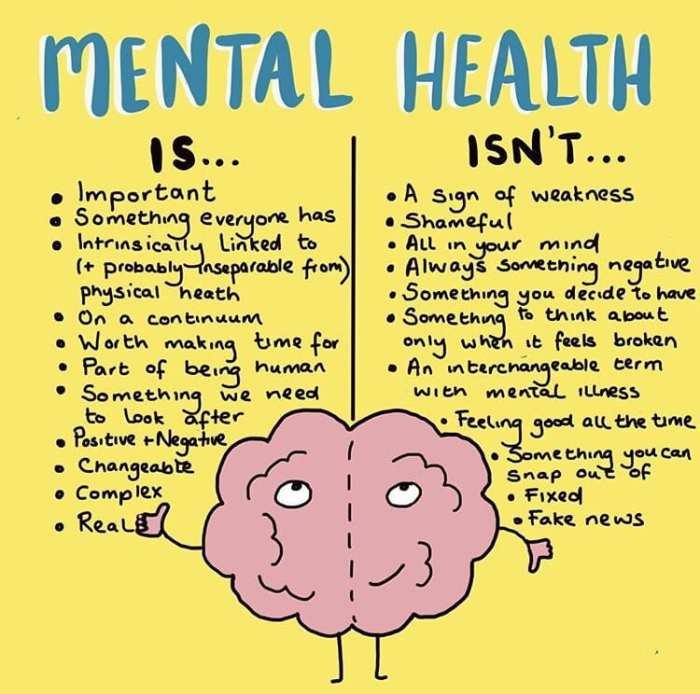
Mental health is a crucial aspect of overall well-being, encompassing our emotional, psychological, and social health. It influences how we think, feel, and behave, impacting our ability to cope with life’s challenges and thrive.
The Multifaceted Nature of Mental Health
Mental health is not a singular state but rather a spectrum. It is influenced by a complex interplay of biological, psychological, and social factors.
Common Mental Health Conditions
Mental health conditions are common and affect millions of people worldwide. Examples of these conditions include:
- Anxiety Disorders:Characterized by excessive worry, fear, and nervousness, often accompanied by physical symptoms like rapid heartbeat, sweating, and difficulty breathing.
- Depression:A mood disorder marked by persistent feelings of sadness, hopelessness, and loss of interest in activities that were once enjoyable.
- Bipolar Disorder:A condition characterized by extreme shifts in mood, energy, and activity levels, ranging from manic highs to depressive lows.
- Schizophrenia:A severe mental illness that affects a person’s ability to think, feel, and behave clearly. Symptoms include hallucinations, delusions, and disorganized thinking.
- Post-Traumatic Stress Disorder (PTSD):A mental health condition that develops after a traumatic event, leading to intrusive thoughts, nightmares, and avoidance behaviors.
Impact of Mental Health on Daily Life
Mental health significantly impacts various aspects of daily life, including:
- Relationships:Mental health conditions can strain relationships with family, friends, and partners, leading to communication difficulties and social isolation.
- Work and School:Mental health issues can affect concentration, productivity, and overall performance in academic and professional settings.
- Physical Health:Mental health conditions are often intertwined with physical health problems, as they can contribute to chronic pain, sleep disturbances, and weakened immune systems.
- Overall Well-being:Mental health plays a vital role in our overall sense of well-being, influencing our ability to experience joy, fulfillment, and a sense of purpose.
Importance of Mental Health Awareness: Phrases About Mental Health
Mental health awareness is crucial for creating a society that supports and understands the well-being of all individuals. By promoting open conversations and dispelling misconceptions, we can create a more inclusive and supportive environment for those struggling with mental health challenges.
Destigmatizing Mental Health Issues
The stigma surrounding mental health issues can be a significant barrier to seeking help. It often leads to feelings of shame, isolation, and fear of judgment, preventing individuals from accessing the support they need. Destigmatizing mental health issues is essential for promoting early intervention and improving access to care.
- Educate and Raise Awareness:Promoting mental health awareness through public campaigns, educational programs, and community events can help break down stereotypes and misconceptions. This can involve sharing personal stories, providing accurate information about mental health conditions, and highlighting the importance of seeking help.
- Challenge Negative Perceptions:Actively challenging negative stereotypes and discriminatory language surrounding mental health is crucial. Encouraging open and respectful conversations about mental health can help normalize these issues and create a more understanding and supportive environment.
- Promote Positive Role Models:Sharing stories of individuals who have successfully managed their mental health challenges can inspire hope and demonstrate that recovery is possible. Highlighting the experiences of celebrities, athletes, or other prominent figures who have spoken openly about their mental health can help reduce stigma and encourage others to seek help.
Benefits of Early Intervention and Support
Early intervention and support are essential for improving outcomes for individuals with mental health challenges. By recognizing and addressing mental health issues early on, we can prevent the development of more severe symptoms and improve overall well-being.
- Improved Mental Health Outcomes:Early intervention can help individuals access appropriate treatment and support, leading to better management of symptoms, reduced risk of relapse, and improved quality of life. For example, a study published in the Journal of the American Medical Association found that early intervention for depression in adolescents led to significant improvements in symptoms and reduced risk of suicide.
- Reduced Long-Term Impact:Early intervention can also help prevent the development of chronic mental health conditions and reduce the long-term impact of mental illness. By addressing mental health challenges early on, individuals can minimize the potential for significant disruption to their education, employment, and relationships.
- Increased Access to Resources:Early intervention can also help individuals access a wider range of resources and support services, including therapy, medication, and support groups. This can empower individuals to take control of their mental health and build resilience.
Campaign Promoting Mental Health Awareness
A comprehensive campaign promoting mental health awareness should aim to educate the public, challenge stigma, and encourage early intervention.
Phrases about mental health often highlight the importance of self-care and well-being. It’s crucial to remember that mental health is just as important as physical health, and both contribute to a fulfilling life. A great resource for learning more about how to prioritize both is for health for life , which offers valuable insights and tips.
By focusing on both our physical and mental health, we can cultivate a more balanced and fulfilling life, and phrases about mental health can serve as reminders of this vital connection.
- Use Multiple Channels:The campaign should utilize a variety of channels to reach a wide audience, including social media, television, radio, print media, and community events. This can involve creating engaging content, running public service announcements, and partnering with organizations and influencers to spread the message.
- Focus on Inclusivity:The campaign should be inclusive and represent the diverse experiences of individuals with mental health challenges. This can involve featuring stories from people of different backgrounds, ages, and identities, and using language that is accessible and respectful to all.
- Promote Action:The campaign should encourage people to take action to support their own mental health and the mental health of others. This can involve providing information on how to access resources, promoting healthy coping mechanisms, and encouraging open conversations about mental health.
Phrases Reflecting Mental Health Experiences
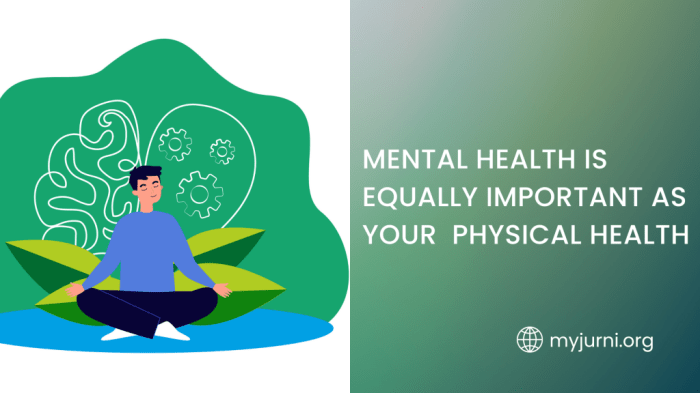
Mental health struggles are often expressed through everyday language, and understanding these phrases can provide valuable insights into the lived experiences of individuals facing mental health challenges.
While the specific words used may vary depending on the individual’s background, culture, and personal experiences, common phrases can shed light on the emotional, cognitive, and behavioral aspects of mental health conditions.
Common Phrases Reflecting Mental Health Struggles
Individuals struggling with mental health conditions often use phrases that reflect their internal experiences, feelings, and challenges. These phrases can be categorized based on their emotional impact and the specific aspects of mental health they represent.
- Feeling overwhelmed or exhausted
- Experiencing difficulty concentrating or focusing
- Feeling isolated or disconnected from others
- Having trouble sleeping or waking up
- Experiencing changes in appetite or weight
- Feeling anxious, worried, or fearful
- Feeling sad, hopeless, or depressed
- Having thoughts of self-harm or suicide
- Feeling angry, irritable, or frustrated
- Experiencing intrusive thoughts or flashbacks
- Having difficulty controlling emotions or impulses
Phrases Used by Individuals with Different Mental Health Conditions
While the phrases used by individuals with different mental health conditions can overlap, there are also some specific phrases that are more commonly associated with certain conditions. For example, individuals with anxiety disorders might frequently use phrases like:
- “I feel like I’m going to have a panic attack.”
- “I’m constantly worrying about everything.”
- “I can’t seem to relax or calm down.”
Individuals with depression might use phrases like:
- “I feel empty and hopeless.”
- “I don’t enjoy anything anymore.”
- “I just want to sleep all the time.”
Individuals with post-traumatic stress disorder (PTSD) might use phrases like:
- “I keep having nightmares about the trauma.”
- “I feel jumpy and easily startled.”
- “I avoid situations that remind me of the trauma.”
Categorizing Phrases Based on Emotional Impact
The emotional impact of phrases reflecting mental health struggles can be categorized based on the intensity and nature of the feelings expressed. For example, phrases that reflect feelings of anxiety or fear might be categorized as “high-intensity” emotions, while phrases that reflect feelings of sadness or hopelessness might be categorized as “low-intensity” emotions.
It’s important to note that these categories are not absolute and can vary depending on the individual’s personal experiences and the specific context of the phrase.
- High-intensity emotions: Panic, fear, anger, rage, despair, terror
- Low-intensity emotions: Sadness, hopelessness, loneliness, emptiness, apathy
- Mixed emotions: Confusion, frustration, guilt, shame, self-doubt
Phrases Promoting Mental Well-being
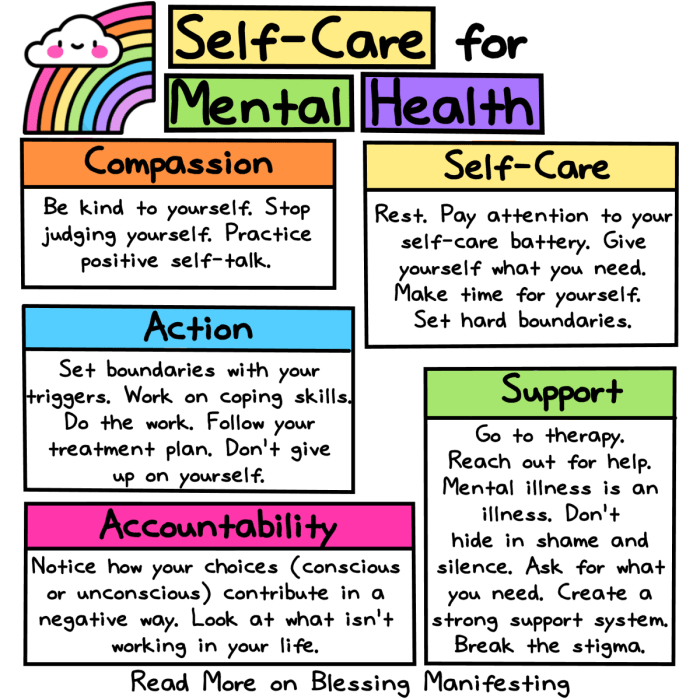
Mental well-being is an essential aspect of overall health and happiness. It encompasses our emotional, psychological, and social well-being, and it plays a crucial role in how we think, feel, and behave. By promoting positive mental well-being, we can enhance our resilience, cope with life’s challenges, and lead more fulfilling lives.
Phrases Encouraging Self-Care
These phrases encourage self-care and prioritize mental well-being. They emphasize the importance of taking time for oneself, engaging in activities that bring joy, and nurturing our mental health.
“Take a break. You deserve it.”
“Prioritize your well-being. It’s not selfish, it’s essential.”
“It’s okay to say no to things that drain your energy.”
“Remember to breathe. You are stronger than you think.”
Phrases about mental health can be powerful tools for communication and support. They can help us express our feelings, connect with others, and seek help when we need it. Many family health centers, like this one , offer mental health services as part of their comprehensive care.
These centers provide a safe and supportive environment for individuals and families to address their mental health needs.
“Be kind to yourself. You are doing your best.”
Examples of Phrases in Everyday Conversations
These phrases can be integrated into everyday conversations to promote positive mental health. They can be used to encourage others to prioritize their well-being, offer support, and remind them of their own strength.
“Hey, how are you feeling today? It’s okay to not be okay, you know.”
“I noticed you’ve been working really hard lately. Remember to take some time for yourself, even if it’s just for a few minutes.”
“I’m here for you if you need someone to talk to. It’s important to have someone to lean on.”
“You’re doing great. Keep going, you’ve got this!”
“Remember to celebrate your successes, no matter how small they may seem.”
Impactful Phrases for Others
These phrases have been impactful for others in promoting mental well-being. They have provided comfort, encouragement, and a sense of validation, reminding individuals that they are not alone in their struggles.
“Hearing someone say, ‘It’s okay to not be okay,’ made me feel less alone in my struggles.”
“Being reminded to prioritize my well-being helped me to realize that I wasn’t being selfish, I was taking care of myself.”
“The phrase ‘You’re doing great. Keep going, you’ve got this!’ gave me the boost of confidence I needed to keep going.”
“Being told to ‘Remember to breathe’ helped me to calm down and regain control during a stressful situation.”
“The phrase ‘Be kind to yourself. You are doing your best’ reminded me to be more compassionate towards myself.”
Phrases about mental health can often be a powerful tool for self-reflection and understanding. Taking care of your physical well-being can play a crucial role in supporting your mental health, and a strong leg workout can be a great way to start.
You can find some great leg fitness workout routines here that will challenge you and leave you feeling energized. Remember, both physical and mental health are interconnected, and taking care of both is essential for overall well-being.
Phrases for Seeking Help
Seeking help for mental health concerns can be a challenging step, but it is an important one. Starting a conversation about your mental health can feel daunting, but there are ways to approach these conversations with confidence and clarity. Using language that is respectful, understanding, and specific can help you effectively communicate your needs and get the support you deserve.
Approaching the Conversation
It is important to use language that is respectful and understanding when talking about mental health. This includes using terms that are not stigmatizing or offensive. For example, instead of saying “I’m crazy,” you could say “I’m feeling overwhelmed.” Here are some examples of phrases you can use to initiate conversations about your mental health concerns:
- “I’ve been feeling really stressed lately and I think I need some help.”
- “I’ve been struggling with my anxiety and I’m wondering if you could help me find some resources.”
- “I’ve been feeling down for a while and I’m not sure what to do about it.”
Navigating Different Scenarios, Phrases about mental health
The way you approach a conversation about your mental health may vary depending on the person you are talking to. Here are some phrases you can use in different scenarios:
Talking to a Friend or Family Member
- “I’m going through a tough time right now and I could really use your support.”
- “I’m not sure how to talk about this, but I’m struggling with my mental health and I need someone to listen.”
- “I’m feeling overwhelmed and I’m wondering if you could help me find a therapist.”
Talking to a Therapist or Counselor
- “I’m here because I’ve been struggling with my mental health and I’m looking for some help.”
- “I’m feeling [specific emotion] and I’m not sure how to cope.”
- “I’ve been experiencing [specific symptoms] and I’m wondering if you can help me understand what’s going on.”
Talking to a Doctor
- “I’ve been feeling [specific symptoms] and I’m wondering if it could be related to my mental health.”
- “I’ve been struggling with my mental health and I’m hoping you can help me find a therapist or counselor.”
- “I’m concerned about my mental health and I’d like to discuss some treatment options with you.”
Remember
It is important to remember that you are not alone in your struggles. There are people who care about you and want to help. Seeking help is a sign of strength, not weakness.
Phrases for Offering Support
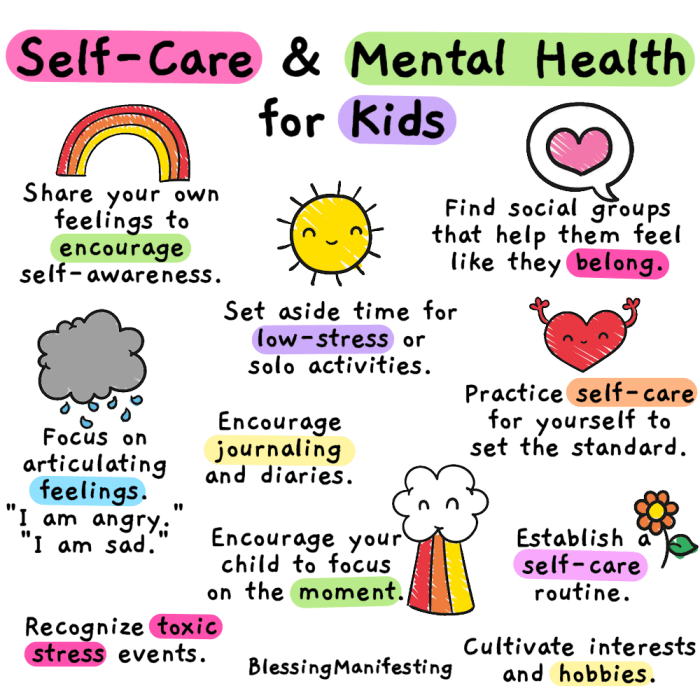
Offering support to someone struggling with mental health can be a powerful act of kindness. It can help them feel less alone, validated, and more hopeful. Choosing the right words can make a big difference in their journey toward healing.
The Importance of Active Listening and Validation
Active listening and validation are crucial elements of offering support. Active listening involves paying full attention to the person speaking, showing empathy, and asking clarifying questions. Validation means acknowledging and accepting their feelings without judgment.
“I hear you saying that you’re feeling really overwhelmed right now. It’s okay to feel that way. I’m here to listen.”
This phrase demonstrates both active listening and validation. It acknowledges the person’s feelings and offers a safe space for them to express themselves.
Examples of Supportive Phrases
Here are some examples of phrases that can offer empathy and understanding:
- “I’m so sorry you’re going through this. I can’t imagine how difficult it must be.”
- “It sounds like you’re really struggling. Is there anything I can do to help?”
- “I’m here for you, no matter what.”
- “I know you’re strong, and you’ll get through this.”
- “It’s okay to not be okay. We all need support sometimes.”
These phrases convey empathy, concern, and a willingness to help. They also avoid minimizing or dismissing the person’s experience.
Phrases in Different Cultures
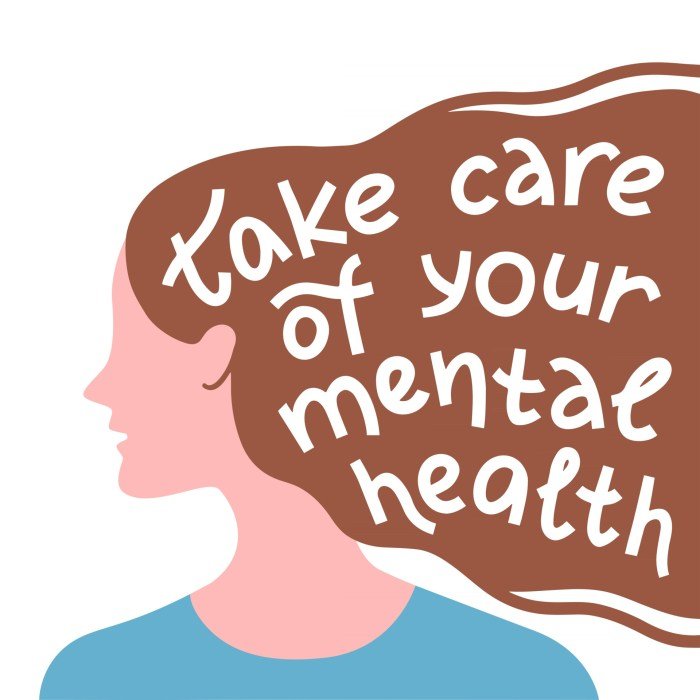
Mental health is a universal experience, but the ways we talk about it can vary significantly across cultures. Understanding these cultural nuances is crucial for fostering inclusive and effective communication about mental well-being.
Cultural Differences in Language
The language used to describe mental health experiences can reflect cultural beliefs, values, and understandings of the mind and body. For example, in some cultures, mental health issues may be attributed to spiritual or supernatural causes, while in others, they may be seen as primarily biological or psychological.
- Somatization:In some cultures, mental distress may be expressed through physical symptoms rather than emotional ones. For example, in China, the concept of “shenjing shuairuo” (nervous weakness) is often used to describe a range of mental health issues, including anxiety and depression, and may manifest through physical symptoms like fatigue, headaches, and insomnia.
- Stigma and Shame:The stigma associated with mental illness can vary widely across cultures. In some cultures, mental health issues may be seen as a sign of weakness or personal failure, leading to reluctance to seek help.
- Cultural Idioms:Many cultures have unique idioms or expressions that reflect their specific understanding of mental health. For instance, the Japanese phrase “kokoro no byōki” (heart disease) is often used to describe mental illness, highlighting the connection between emotional well-being and physical health.
Comparing and Contrasting Phrases
Here are some examples of how phrases used to describe mental health differ across cultures:
| Culture | Phrase | Meaning |
|---|---|---|
| English | “I’m feeling stressed.” | Experiencing mental and emotional pressure. |
| Spanish | “Estoy muy agobiado.” | Feeling overwhelmed and burdened. |
| Arabic | “أنا متوتر جداً.” | Feeling extremely tense and anxious. |
| Japanese | “心が疲れている。” | Feeling emotionally exhausted. |
Challenges in Cross-Cultural Communication
Differences in language and cultural perspectives can create significant challenges in cross-cultural communication about mental health. These challenges include:
- Misunderstandings:The same phrase can have different meanings in different cultures, leading to misunderstandings and misinterpretations.
- Stigma and Discrimination:Cultural stigma and discrimination can make it difficult for individuals to disclose their mental health experiences, especially when communicating with people from different cultural backgrounds.
- Lack of Cultural Sensitivity:Mental health professionals may lack cultural sensitivity, leading to ineffective or insensitive treatment approaches.
Summary
Ultimately, the language we use to discuss mental health matters. By understanding the power of phrases, we can create a more supportive and compassionate environment for individuals facing mental health challenges. Whether you’re seeking help, offering support, or simply trying to understand the experiences of others, choosing the right words can make a significant difference.
Frequently Asked Questions
What are some common phrases used to describe mental health struggles?
Some common phrases include “feeling down,” “stressed out,” “anxious,” “depressed,” “having a panic attack,” and “experiencing intrusive thoughts.”
How can I use phrases to promote mental well-being?
Phrases like “self-care is important,” “take a break,” “you’re not alone,” and “it’s okay to ask for help” can encourage positive mental health practices.
What are some phrases for seeking help with mental health concerns?
You can say things like “I’m struggling with my mental health,” “I need to talk to someone,” or “I’m looking for resources to help me.”